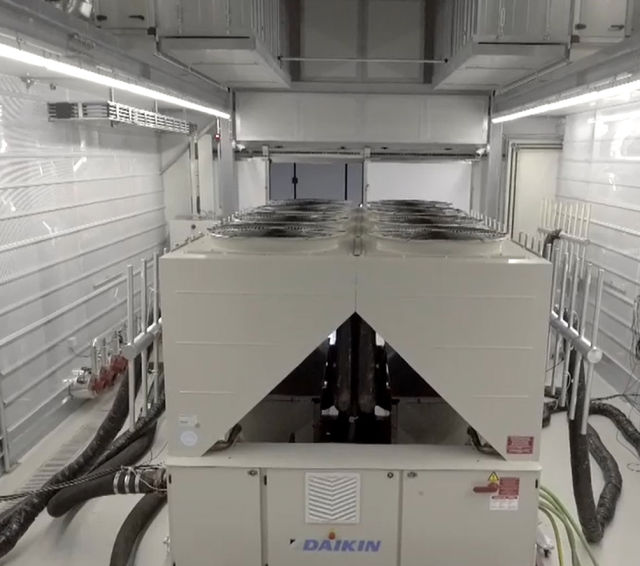Meeting the Branson challenge

Virgin founder and world-famous marketeer Richard Branson wants the air conditioning market to make radical technical changes, but Daikin Applied UK’s James Henley* believes that manufacturers are already on the right track.
We should take it as a complement that one of the world’s best-known business figures has chosen air conditioning as the next target for his considerable skills in market “disruption”. His intervention in the debate about energy efficiency has helped to raise the profile of an industry that is crucial to the lives of many millions.
Sir Richard believes air conditioning technology has not evolved much in the 100 years since it was discovered and criticises manufacturers for being “entrenched” and “complacent”. He believes there is still tremendous potential for innovation in an industry that is already worth around $100bn and could multiply by a factor of four in the next 30 years.
“As our planet warms, we need it [air conditioning] more than ever to keep our people cool,” he wrote in his Virgin Blog. “Worldwide, by 2030, extreme heat could lead to a $2 trillion loss in labour productivity. India’s economy alone stands to lose $450 billion (not to mention the 200 million Indians exposed to dangerous heat conditions each year).
“If we can trigger a major technology change, it could be the single biggest technology-based step we can take to arrest climate change,” he added.
The reason he decided to get involved was the launch of the $3m Global Cooling Prize (www.globalcoolingprize.org) by the highly respected energy research body the Rocky Mountain Institute. This prestigious and valuable award is supported by the Indian government, which is understandably concerned about how it is going to keep its huge and growing population cool in an economically viable and sustainable way.
The award aims to “shine a spotlight on potential breakthrough cooling solutions” and provide funding for projects that can advance our knowledge of cooling technologies.
The Institute and Sir Richard argue that cooling technology has only achieved 14% of its ‘theoretical’ energy efficiency. Clearly, this is a reference, primarily, to basic residential equipment and does not take into account many of the major technical breakthroughs our industry has already achieved.
Of course, there are thousands of installed systems around the world that fail to meet modern energy efficiency standards, but that is often because of the prevailing economic circumstances and does not mean better options are not widely available. Quoting 14% as a global efficiency figure is unfair and does not give credit to manufacturers for the performance improvements they have made over several decades.
Air conditioning manufacturers are acutely aware that there is an inextricable link between efforts to minimise harmful emissions and the need for ever improving energy efficiency. As an industry, we have been challenged hard to find ways to minimise the use and leakage of potentially harmful refrigerant gases – driven primarily by the F-Gas legislation in Europe – but have also managed to do this while continually improving energy performance.
The challenge we face now is to make our best technology available to the widest possible market and that, often, comes down to what a particular type of customer can afford.
As a recent report from the International Energy Agency (IEA) revealed, by using technology that is already available it would be possible to keep building energy use at today’s level despite a predicted doubling of demand for building air conditioning between now and 2040.
The EIA Energy Efficiency 2018 report showed that cooling energy use in buildings has already doubled since 2000 due to population growth and the surge in construction, but our industry has also been busy developing improved technology to mitigate the potential impact on the environment.

Chiller technology, for example, is evolving fast and not just because of F-Gas regulations, but because we remain committed to the energy efficiency improvements enshrined in market drivers like the EU’s Ecodesign regulations and because we want to give end users the best possible performance.
Daikin Applied came to the market very early with a new generation of high efficiency air-cooled scroll chillers using R32 refrigerant. Switching to R32 has allowed us to achieve a 10% improvement in seasonal energy efficiency ratio (SEER) compared with equivalent equipment using R410a.
Equally significantly, a chiller using R32 has a 63% lower CO2 equivalent charge than a similar capacity R410a counterpart. In the event of any leakage of refrigerant gas to the atmosphere that is a major difference and marks a considerable technical advance in line with the aims of F-Gas regulators. It also means that an end user can significantly reduce their potential impact on the environment and meet all their legislative obligations with no loss of performance.
Other equipment innovations such as heat recovery and energy storage to enable wider integration of renewables into building services systems give engineers more flexibility. They also have to consider other challenges like the pressing requirement to improve indoor air quality in the face of rising outdoor pollution.
In other words, this is a complex area with a range of factors to take into account.
The air conditioning sector expends a lot of time, money and effort in the field of R&D. It is a sector where pushing the boundaries and striving for the next innovation is key to success in the market. But fast track development is also driven by the changing demands of markets and legislation – and an understanding that we need to future proof designs for the peace of mind of both the contractor and the end user.
Something that Sir Richard would, surely, applaud.
If we get product development right, then the market will be able to cope more easily with the rapid shift to new refrigerants, which means we have a careful balancing act to perform in order to get best value for clients.
We are, therefore, addressing the twin challenges of direct emissions from refrigerant gas, which Sir Richard also highlighted in his blog, while continuing to deliver the wider and more nuanced challenges of improved energy performance for the potential benefit of hundreds of millions of people worldwide.
We are driven to improve and evolve because we know we still have to go further and faster, but our track record to date shows we are up to the challenge and will keep pushing the boundaries of what cooling technology can achieve.
*James Henley is product development manager for Daikin Applied (UK) Ltd.







